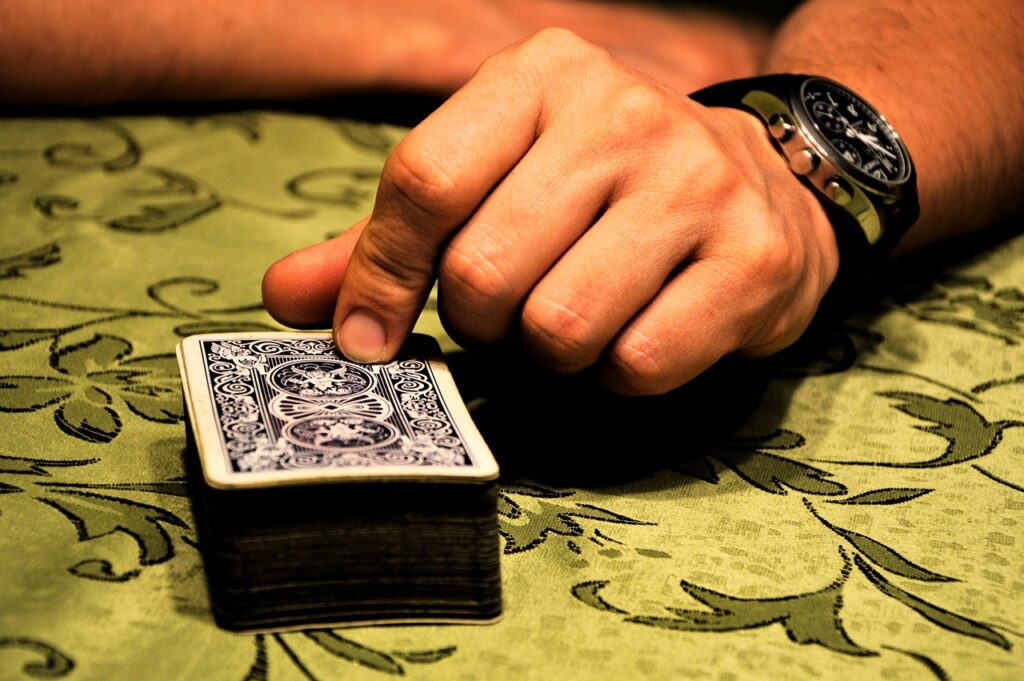Have you ever gambled and lost the majority of your funds? Or while gambling, you win your first 2 stakes, then thereafter start a continuous streak of losing till you are out of funds. Then you start to ask the question “what percentage of people lose their money to gambling”. You might think this is just bad luck. Also, you might think this is just a personal issue. Asking around, you realize you are alone. A lot of other individuals face the same problem that you are facing.

What Percentage of People Lose Money Gambling?
In every gambling game, the odds are always against the players. The house always has a mathematical advantage over the players. In the short run, you might think you are winning against the house. But throughout the continuous play, you realize the saying “the house always wins” is true. Like in a game of roulette, when you pick a number to bet on, the chance of you winning is 1:37. I.e. your chances are as slim as you winning once in every 37 attempts. Let us break it down below.
If you placed a bet of $10 on roulette 38 consecutive times, mathematically speaking, you would win just once. (You might be lucky to win more than once. But this is just a hypothesis). Your total winnings would be $350. Winning once would mean you win $350. Remember you lost 37 other times. Meaning you lost $370. This brings the overhead to $20 when you spin 38 times. Also, this is $0.526 on every spin.
It is important to note that this mathematical calculation is calculated over a prolonged period of time. In the short term, the result may seem random. The result may only look as stated above when a certain number of rounds of games have been played.
Gambling in the US
In the US, the question “what percentage of people lose their money to gambling is rare asked. About roughly 80% have engaged in gambling at one point in time or other in their lifetime. In the same light, a further 15% are regular gamblers who engage in gambling every week. Of the total population in the USA, the number of adults who have a gambling problem stands at six million. While a further 500000 youths have the same problem.
As of 2020, the estimated worth of the gambling industry was $110,000,000,000 (110 billion) and is still fast-growing. It is easily one of the fastest-growing industries in the US.
Getting into debt from gambling is more common than you think. On a regular basis, people who lose their money to gambling are usually borrowing more money with the mindset of hitting big and repaying their losses. They usually take overdraft on their credit cards, they overdraw their accounts. They basically look for money anywhere they can find it, just to try and balance things up. The shocking aspect of this is that 23 million people in the US are due to the fact that they gamble. This puts the average loss of gamblers at an estimated value of roughly $55,000
Hardly would you ever hear of a casino going into loss? Interestingly, it can be said that for every gain the casino makes, someone somewhere has incurred some debts which, in the long run, if not checked, would lead to the accumulated debt over time.
Another interesting detail about this is that the American Gaming Association sets aside over 300 million dollars on a yearly basis for the purpose of intervening and giving support to gamblers who are now suffering from addiction.

Why Do You Lose?
There are people who see gambling as a source of living and survival. Although this is small compared to the number of people who are casual gamblers. People who survive gambling are usually grounded properly in statistics. They also have a good amount of control over their emotions and, therefore, do not make irrational decisions. If you do not meet these criteria, you are more likely to belong to the group of people who make little or no profit from betting.
You do not need to be a statistician to know that the odds will never favor you. If you look at the world’s statistics, you would realize that America is one of the top leaders when it comes to losses from betting. In 2016, it was estimated that America lost 117, 000, 000,000 dollars was lost in legitimate means of gambling while a further 100 billion-plus was also lost to illegitimate means of gambling.
In 2020, the average money owed by men who were found to have a problem with gambling was placed in the range of $55,000-$90,000 while on average, the accumulated debt by female gamblers was placed at 15,000
Effects of Losing Your Money
Bankruptcy is also one of the major outcomes of gamblers who lose their money. as it drains them of every source of funding and can even lead to legal suits being filed against you. Statistics have shown that as many as 20% of people obsessed with gambling file for bankruptcy due to their losses.
The damage to the individual is enormous. Their marriage dissolves as they can not manage their normal life and gambling life together. This is in the ratio of 2:1 as compared to those who do not engage in gambling.
For non-gamblers, the rate of suicide is one in every 100 people. While the statistics for gamblers drop drastically to one in every 5 people.
It is always interesting to note that most gambling houses run something like a loan scheme in short terms which is taken from your winnings and charged back to your account. The interest rate varies from 3-10%. Unknown to most, the gamblers from the casino borrow half the money you spend in a casino.
One of the major highlights of getting addicted to gambling is the fact that they are never financially stable. Even when an individual becomes financially stable, it doesn’t last and they quickly go back to bad gambling habits. Usually, the gambler’s credit cards are maxed out, they fail to meet up with their payments for bills and sometimes loans. And yes, they owe a lot of money.

Paying Off My Gambling Debt
After you realize that you are addicted to gambling, the next step is for you to seek help. After seeking help, you must realize the debts would not payoff themselves.
It is usually advisable to get in contact with a credit advisor from a debt management agency.
The job of the advisor is to help them find a way out of the mess they got themselves into. This can take a rather long period of time. So if you are close to them, be patient with them as they make their way to being debt-free.
One thing you have to realize is that all debts are similar. Just take it the same way you would pay your regular debts.
Here are some tips:
Make a List of Your Debts (amount and collector)
Writing down the names of everyone you owe is important as this gives you clarity on where to start from, who you owe the most and the least. He helps you to create an order of payment. Be sure to include everyone, ranging from casinos to even the money gotten from individuals.
Pay in Bits
Most times, we have the tendency to want to pay off our debts once. This most times would be a futile effort. If you do not get bulk payment, it would be advisable to start your payment with the little you get. This might seem small to you at first, but gradually, you realize you are making steady growth, which is better than none.
Create an Alternative Source of Income
If you want to get rid of your debts fast, you need a second source of income. This can come in the shape of a second job. This might increase the stress on you, but you realize that you will end up paying your debts in double-quick time.
Work With a Budget
This is the stage where you have to calculate every money coming in and every money going out (income and expenditure). Once you ascertain that your income exceeds your expenditure, the next step is to cut off unnecessary stuff from your budget. For instance, if your car spends most of its time at the repair house, it would be advisable to park the car at home and hit the trains or the mass transit. This would help cut out the money allocated to repairing the car.
Consider Declaring Bankruptcy
Doing this should mean that you have exhausted all possible means of getting out of debt. When you file for bankruptcy, no one might take your debts away, but in most cases, they do. When someone cancels your debts, it would affect your credit scores for the next 10 years, to say the least. So be sure you have exhausted all options before setting for this.
The Verdict
In conclusion, there is no exact answer to the question “what percentage of people lose their money to gambling”, but the statistics and range we have seen above tell us that the ratio of losing to winning is extremely high.



